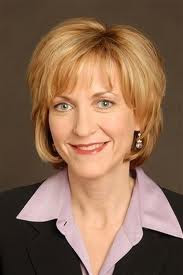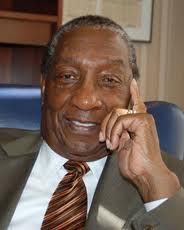 COLUMBUS, Ohio-Less than a week after U.S. Rep Marcia Fudge (D-11) announced her bid for reelection and snatched endorsements from nearly all of the Democratic elected officials from her 11th Congressional District including a host of mayors, members of the state legislature , and Cleveland and Akron city council members, the Republican controlled state legislature passed controversial HB 369, a state law of Ohio's revised map of 16 new congressional districts.
COLUMBUS, Ohio-Less than a week after U.S. Rep Marcia Fudge (D-11) announced her bid for reelection and snatched endorsements from nearly all of the Democratic elected officials from her 11th Congressional District including a host of mayors, members of the state legislature , and Cleveland and Akron city council members, the Republican controlled state legislature passed controversial HB 369, a state law of Ohio's revised map of 16 new congressional districts.
U.S Rep. Dennis Kucinich (D-OH)
Ohio State Sen. Nina Turner (D-Cleveland)

Ohio State Rep. Sandra William (D-Cleveland), also president of the Ohio Legislative Black Caucus

Currently Ohio has 18 congressional districts with 13 seats held by Republicans and five by Democrats.
The Buckeye state will lose two congressional seats due to declining population growth per the 2010 Census Report while states like Florida and Texas with an influx of Hispanics will gain congressional seats.
The new map draws congressional districts of 12 that lean Republican and only four that the Democrats are likely to win beginning with next year's congressional elections.
The deadline for taking out petitions for the office is Dec 30.
The Ohio Senate passed the measure 27-6 last Wed., nearly an hour and a half after the House approved it, and Gov. John Kasich, a right wing Republican, quickly signed the bill into law. Both chambers passed the measure with a super majority vote, which precludes a repeal of the law through a referendum by Ohio voters at the ballot box.
Fudge, through her spokesperson, said that she will run on her record, but that a new congressional map that favors Republicans with 12 seats that its candidates can likely win to four for the Democrats does not reflect the will of the people since Ohio is equally as Democratic as it is Republican.
"As we've said before, the congresswoman will run on her record, but the congresswoman does not believe that the redistricting process reflects the will of the people since the state of Ohio has as many Democrats as Republican voters and the new congressional map was drawn by the Republicans and favors the Republicans," said Belinda Prinz, Fudge's communications director.
Like the U.S. House of Representatives and U.S. Senate, state legislatures have a House of Representatives and a Senate too. But instead of enacting federal laws like Congress, legislators there enact state laws, also called statutes, with city councils and villages enacting laws dubbed ordinances.
HB 369, which also calls for a bi-partisan committee of state legislators to study redistricting reform, ends months of political wrangling over the once-per-decade congressional redistricting process that by state law is done by the state legislature rather than Congress.
And Black Democratic state legislators from Cleveland, other than Rep. Sandra Williams (D-11), the leader of the Ohio Legislative Black Caucus who joined 16 other majority Black Democrats in the Republican-led House of Representatives to pass the bill 77-17, are angry because through the congressional remapping process the largely Black city of Cleveland expects to lose one of two congressional seats.
Under the new map Fudge's predominantly Black 11th Congressional District, which includes the majority Black east side of Cleveland and its eastern suburbs in Cuyahoga County, is relatively safe for next year's election, political experts say. Black leaders like Cleveland NAACP President George Forbes, retired U.S. Rep. Louis Stokes , who once held the congressional seat that Fudge now has for 30 years as the first Black, and political strategist Arnold Pinkney, together dubbed part of Cleveland's Old Black Political Guard, made sure of that through negotiations with Ohio House Speaker William Batchelder (R-69).
A Medina Republican and retired Ninth District Court of Appeals judge of Ohio, Batchelder is married to Alice Moore Batchelder, the chief judge in the federal Sixth Circuit Court of Appeals in Cincinnati who was once considered by former president George W. Bush as a nominee for a U.S. Supreme Court seat.
Bathchelder and Cleveland's Old Black Political Guard, with a handful of Ohio Black legislators, most from Cleveland, had all pushed a congressional map two months ago through the now-in-limbo HB 319. It gave more protection to Kucinich's seat, but Ohio Democratic Party Chairperson Chris Redfern threatened a repeal through signatures for a voter's referendum and HB 369 became the compromise to the dispute.
Redfern wanted more than the 12 to 4 Republican to Democrat ratio that the old map under HB 319 had but as time was nearing for the signatures needed this month for a ballot issue to seek to repeal HB 319 next year by Ohio voters, Democrats came to realize that state law gives the partisan party in power an edge over congressional redistricting. And since the Republicans currently represent 13 of the 18 districts that were shrunk to 16 last week through HB 369 they held on tight to the argument that the new congressional map is not far fetched, an argument that Democrats reject. Hence, the 12 to 4 Republican to Democrat ratio found in HB 319 is also in the now governing HB 369, a state law that promises more discussion, particularly in Black circles in major cities of Ohio like Columbus, Cincinnati, Toledo, Dayton and Cleveland.
Once labeled the 21st Congressional District and a stronghold for Black political wannabes from its municipalities like Cleveland, the 11th Congressional District , as newly remapped, stretches 35 miles south to Akron in Summit County to pick up voters along the way and from a pocket of Black voters there so that it is not gerrymandered to the detriment of Black voters in violation of the Voting Rights Act of 1965.
But U.S. Rep. Dennis Kucinich, whose 10th Congressional District includes parts of Cleveland's largely White west side, had his district practically merged with 11- term 9th Congressional District Rep. Marcy Kaptur, a Toledo Democrat whose philosophical views mirror Kucinich's, though he is farther to the left than any of the 435 congress people and an outspoken anti-war advocate.
Kaptur had the clout over the controversial Kucinich to have 90,000 more voters thrown her way in the last days before the new map was drawn into law through HB 369. The new combined district hugs the Lake Erie shoreline from Cleveland to Toledo.
The other congressional seat at risk as to the reduction from 18 to 16, is Copley Township Democrat Betty Sutton (D-13), who lost part of her district of Akron voters to Fudge and whose district was merged and reconstructed to favor the re-election of freshman GOP Rep. Jim Renacci of Wadsworth.
"I voted against House Bill 369 because the congressional map puts the majority Black 11th Congressional District at risk by making it more likely for a White candidate that would normally seek the congressional seat that Rep. Dennis Kucinich now holds that they are getting rid of for Rep. Kaptur to come after the seat that Rep. Fudge now holds," said state Rep. Bill Patmon (D-10), a Cleveland Democrat and former city councilman who lost a bid for mayor in a non-partisan race against incumbent mayor Frank Jackson in 2009."When two prominent Blacks enter a congressional race with a substantial number of Whites voters, the vote can be split for the White candidate to win."
Cleveland senators Shirley Smith (D-21) and Nina Turner (D-25), who announced earlier this month that she would take on Fudge in next year's March 6 Democratic primary for Congress, joined Patmon and state Rep. John Barnes Jr. (D-12) as Black state legislators from Cleveland that, other than Williams, all opposed HB 369.
"The congressional map as passed is not in the interest of Cuyahoga County, Ohio's largest county and the center of business and cultural activity," said Barnes. "We could lose, depending on the political dynamics, a historical congressional district and then could lose significant resources and influence.
Williams did not return phone calls seeking comment.
Sources claim that Williams, as the leader of the Ohio Black legislative group, sold out Kucinich in voting for HB 369, and accordingly Cleveland lost out too. The promise to Williams, they claim, is support by the Ohio Democratic Party to replace the term limited Smith as an Ohio senator, who is in the first year of her final four-year term.
Others say that Williams simply looked out for the 11th Congressional District where she resides and Black gains through more voters in a revised predominantly White congressional district in Dayton and a new congressional district in Columbus that is now 29 percent Black that will likely go to a Democrat.
Patmon said that the gains through redistricting in Columbus and Dayton that drew support on HB 369 from a majority of Ohio's Black legislators are minimal for the Black community and that Black candidates will likely lose election to Congress in those cities next year. He said that it was not worth losing the seat in Cleveland, if Kucinich loses to Kaptor next year.
Fudge is the only Black congressperson among the three bordering states of Ohio, Kentucky and Tennessee.
According to the 2010 U.S. Census Report Cleveland is 51 percent Black, Columbus and Toledo are roughly 24 percent Black, some 43 percent of the people that reside in the cities of Cincinnati, Youngstown and Dayton are Black, and 28 percent occupy Akron.
E. Cleveland, an impoverished Black suburb that borders Cleveland, still remains Ohio's Blackest municipality. It has a Black population of about 93 percent.
A former Cleveland mayor and unsuccessful candidate for president, Kucinich is a fighter. He describes himself on his campaign website as "America's most courageous congressman."
But some Blacks say that he should slow his tongue on his constant criticism of President Barack Obama, the first Black president of the United States of America.
"You can't bite the hand that feeds you," said Community Activist Marvetta Rutherford." President Obama is a Democrat and so is Rep. Kucinich."
Kucinich could not be reached for comment.
If Fudge, or Kaptur or Kucinich , win their Democratic primaries, the chance of a Republican winning in the general election are slim to none.
Supporters of Kucinich, who has filed petitions to challenge Kaptur in next year's congressional Democratic primary, say that the outspoken congressman can beat the veteran Kaptur, a posture contradictory to what political analysts have said.
"Rep. Kucinich is nationally known and has always been a voice for his constituents and others, " said Leatrice Tolls, a member of Occupy Cleveland. "And Dennis will stand against what is predicted to be a nuclear accident by the Davis- Besse Nuclear Power Station while Rep. Kaptur has not spoken out much on this matter."
Davis-Besse is located on the south west shore of Lake Erie about 10 miles north of Oak Harbor, Oh.


















